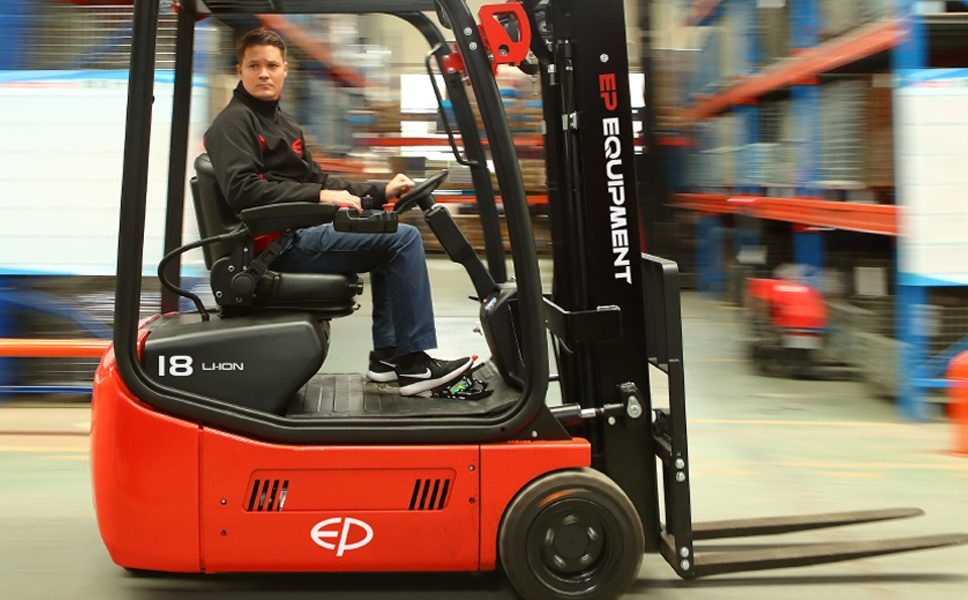A Pallet truck is a compact machine designed for easy movement of goods low to the ground. They’re relatively simple to operate, but that doesn’t mean they’re suitable for anyone to use without adequate training. Many people wonder whether they need training or a pallet truck licence to operate pallet trucks, so let’s take a look at the regulations surrounding these machines and answer some frequently asked questions about the safe handling of pallet trucks.
Do you need a licence for electric pallet trucks?
There is no state licensing system for lift trucks so you don’t need a licence for an electric pallet truck. You do not need a driving licence to operate one either, even if it is a ride-on pallet truck. However, under the PUWER legislation (Provision and Use of Work Equipment Regulations), employers have a legal responsibility to ensure that all personnel who use pallet trucks are adequately trained to protect the health and safety of themselves and others. With this in mind, your employer may ask you to attend a pallet truck training course which involves the provision of a training certificate upon successful completion. Certificates of this nature aren’t licences but they can help employers to demonstrate that they have provided adequate training.
Do you need training to use pallet trucks?
PUWER regulations dictate that employers must provide adequate training for employees to use pallet trucks safely. Supervisors of employers using pallet trucks must also be trained adequately. Training could take place in-house and be delivered by a senior member of staff, provided that it is formally organised and recorded. Many employers opt to outsource training to specialist training providers to ensure it is thorough enough.
What does pallet truck training involve?
The nature of training varies depending on the training provider and the type of pallet truck being used. However, HSE guidelines recommend that training encompasses three stages – basic training, specific job training and familiarisation training. Basic training covers skills and knowledge needed for the safe operation of pallet trucks in general, including safety checks, procedures when loading and unloading, and emergency protocols. Specific job training covers the specific controls and operating principles of the pallet truck set to be used, as well as safety protocols related to the specific tasks set to be completed. Finally, familiarisation training takes place on the job to determine that the skills and knowledge developed in training are applied correctly in practice.
How long does pallet truck training take?
The length and nature of pallet truck training depends on the complexity of the truck being used and the tasks being performed. For example, trucks with very heavy capacity or high lifting capabilities likely require more complex training than those which move pallets close to the ground. It can take anywhere from a few hours to several days.
How often should pallet truck training be refreshed?
PUWER regulations don’t dictate the frequency of training or refresher intervals. Instead, it’s down to employers to determine how often they think refresher training is needed to ensure health and safety protocols are met. They may periodically assess employees’ operation of truck pallets to identify areas for improvement. If new pallet trucks are introduced or tasks involving pallet trucks change, it’s often necessary to undergo refresher training.
How old do you have to be to operate a pallet truck?
The minimum age for operating a pallet truck is the minimum school leaving age which is 16. The exception is when using pallet trucks in ports, in which case the minimum age is 18. When it comes to those aged between 16 and 18, employers have additional responsibilities. They must assess risks to young people, and take into account young employees’ inexperience and psychological and physical immaturity to determine whether it is safe to allow them to use work equipment such as pallet trucks.
Do you need a medical before operating pallet trucks?
There isn’t any legislation relating directly to medicals and the use of pallet trucks. However, as part of their responsibility to keep personnel safe when operating work equipment, employers should assess risk and the need for medicals on a case-by-case basis. For example, certain activities involving pallet trucks, such as moving highly toxic materials, may warrant routine medicals to minimise risks.
What safety checks need to be carried out before using a pallet truck?
Before you begin operating a pallet truck you ought to conduct a quick inspection of the machine to ensure it’s safe to operate. Look for any scratches or cracks on the machine that could indicate damage from an accident. Check for any loose screws or bolts and look out for signs of oil leakages. Check that the wheels move smoothly and the emergency brake works correctly. Test the lifting and lowering functions of the truck work as expected before loading anything onto it. If the truck appears to be failing in any capacity, alert your supervisor and make sure nobody else uses the truck before it is repaired.
If you’re looking for electric or manual pallet trucks, contact our friendly team now to find out more.

